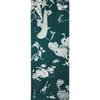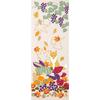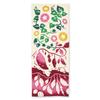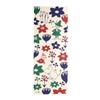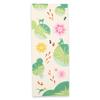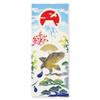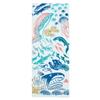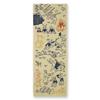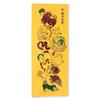Chikusen Japanese Tenugui Japanese Folktale Monkey and Crab Battle 34cm x Made in Japan Hand-Dyed Towel, Series [Approx. 93cm],





Popis
---------------------------------------------------------------------- 【Cautions for using electrical products】 When using electrical appliances, please note that the voltage is different from that of Japan, which may cause malfunctions. Since the plug type is Japan type(A or B type), please check the voltage and use a transformer. Please note that a transformer is different from a conversion adapter. We are not responsible for malfunctions caused by use without a transformer.
【Voltage Compatibility】 When using electrical appliances, please note that they are designed for Japanese voltage specifications (90-110V), so if you use them with a different voltage, it may cause a malfunction.
【Plug Type】 Our products use Japanese plug types (A or B type). Please use a conversion adapter if necessary.
【Important Note on Transformers and Adapters】 A transformer adjusts voltage to match your device’s requirements. A conversion adapter only changes the plug shape and does not adjust voltage. Using only a conversion adapter without a transformer may result in damage to the product.
【Liability】 We are not responsible for malfunctions or damages caused by improper use, such as operating the product without a transformer. ---------------------------------------------------------------------- [Specifications] ▼ "Japanese Folktale Series: Monkey and Crab Battle" ▼ Size: Approx. 34cm x 93cm Material: 100% cotton Country of origin: Japan [Specialty Tenugui] At Chikusen, we are particular about the materials we use for our tenugui, using what we call "rare" materials, a traditional thick thread count and coarse weave. You'll notice this when you try them out, but they absorb moisture well and dry quickly afterwards, and we have continued to use materials with a texture that feels comfortable in your hand, which is perfect for the original purpose of tenugui. Chikusen is a kimono shop that specializes in Edo Komon and yukata, and has been in business since the late Edo period, during the Tenpo era. It was founded about 20 years before Edo culture reached its peak and transitioned into the modern era. The first generation used the unique techniques of Edo dyeing yukata to make a name for themselves, expanding from yukata to Edo Komon, and even portraying their lifestyle in the world of Kabuki. After the war, the shop opened in Asakusa, a place closely associated with the original Chikusen. With the firm beliefs of the founder at its core, the shop continues to carry on the techniques and colors, and its distinctive style has earned it a reputation among the public, earning it recognition from famous department stores and high-end kimono specialty stores. [Authentication] Chikusen dyeing is made using only stencils handed down from the Edo and Meiji periods and the keen intuition of artisans. The single character "Kagami" (Mirror) dyed into the opening of the roll of fabric with the words "Chikusen Kagami-sei" shows this determination. "Kagami" has a strict meaning, such as to serve as a model, a mirror, or a connoisseur. As a trendy SPA-type company, Chikusen has continued to plan, produce, and sell its products in-house. Throughout this, the character "Kagami" has always been a model. [Dyeing] We use a dyeing method called chusen, in which glue is applied along a mold and dye is poured in. This unique technique produces a unique dyed finish that is unique to handcrafted items. The finished product also has a gentle dyeing finish that is unique to this technique. Please note that because all items are hand-dyed, the colors may differ slightly from those shown in the images depending on your viewing environment. [Jikusen] Founded in the late Edo period during the Tenpo era, this kimono shop specializes in Edo Komon and yukata. It was founded around 20 years ago, when Edo culture reached its peak and transitioned to modern times. The first generation used the unique techniques of Edo dyeing yukata to make a name for themselves, from yukata to Edo Komon, and even portrayed their lifestyle in the world of Kabuki. After the war, they opened a store in Asakusa, a place associated with the first Chikusen, and with the firm beliefs of the first generation at their core, they have inherited the techniques and colors, and their unique style has earned them a reputation among the public, earning them recognition from famous department stores and high-end kimono specialty stores. [Authentication] Chikusen dyeing is made using only stencils handed down from the Edo and Meiji periods and the keen intuition of artisans. The single character "Kagami" (Mirror) dyed into the opening of the roll of fabric with the words "Chikusen Kagami-sei" shows this determination. "Kagami" has a strict meaning, such as to serve as a model, a mirror, or a connoisseur. As a trendy SPA-type company, Chikusen has continued to plan, produce, and sell its products in-house. Throughout this, the character "Kagami" has always been a model. [Specially Selected Tenugui] At Chikusen, we are particular about the materials we use for our tenugui, using what we call "rare" fabrics, which are rare these days, with thick thread counts and a coarse weave. You'll notice this when you actually use them, but they have a good absorbency for moisture and quick drying, and we have continued to use materials with a texture that feels comfortable in the hand, which is in line with the original purpose of tenugui. [Dyed] The dyeing method is called chusen, in which glue is applied along a mold and the dye is poured in. This unique technique produces a unique dyed finish that is unique to hand-made products. The finished product also has a gentle dyeing that is unique to this technique. [Note] Please note that all items are hand-dyed and the colours may differ slightly from the images depending on your viewing environment.
![Chikusen Japanese Tenugui Japanese Folktale Monkey and Crab Battle 34cm x Made in Japan Hand-Dyed Towel, Series [Approx. 93cm],](https://img.joomcdn.net/3e20efe96e7cb6ee7a1bbee7f4fe66a04fa356be_original.jpeg)
![Chikusen Japanese Tenugui Japanese Folktale Monkey and Crab Battle 34cm x Made in Japan Hand-Dyed Towel, Series [Approx. 93cm],](https://img.joomcdn.net/e59e896ee67a5ad62b91d78bc25ea1c8a6041189_original.jpeg)
![Chikusen Japanese Tenugui Japanese Folktale Monkey and Crab Battle 34cm x Made in Japan Hand-Dyed Towel, Series [Approx. 93cm],](https://img.joomcdn.net/3dba54f9c89a929943be5bfbe05bfbb1a459f0ea_original.jpeg)
![Chikusen Japanese Tenugui Japanese Folktale Monkey and Crab Battle 34cm x Made in Japan Hand-Dyed Towel, Series [Approx. 93cm],](https://img.joomcdn.net/1cdc28eb74d7c549e679dab4d4ed2ad27b3182c0_original.jpeg)
![Chikusen Japanese Tenugui Japanese Folktale Monkey and Crab Battle 34cm x Made in Japan Hand-Dyed Towel, Series [Approx. 93cm],](https://img.joomcdn.net/7fd520bf8148bca72becf0629928c04e9761de10_original.jpeg)
![Chikusen Japanese Tenugui Japanese Folktale Monkey and Crab Battle 34cm x Made in Japan Hand-Dyed Towel, Series [Approx. 93cm],](https://img.joomcdn.net/1ba99085e0f0b3e72511a2e34c339d1f13623099_original.jpeg)
![Chikusen Japanese Tenugui Japanese Folktale Monkey and Crab Battle 34cm x Made in Japan Hand-Dyed Towel, Series [Approx. 93cm],](https://img.joomcdn.net/336d2e7469f03a2d1e426a5c2e8733fd474ed8d9_original.jpeg)
![Chikusen Japanese Tenugui Japanese Folktale Monkey and Crab Battle 34cm x Made in Japan Hand-Dyed Towel, Series [Approx. 93cm],](https://img.joomcdn.net/bceba9f1a0c8354e1eb05ebc6d8a357f8c9328f6_original.jpeg)
![Chikusen Japanese Tenugui Japanese Folktale Monkey and Crab Battle 34cm x Made in Japan Hand-Dyed Towel, Series [Approx. 93cm],](https://img.joomcdn.net/a5303bd6ff7b3499dea3d542b424e4bec567da85_original.jpeg)
